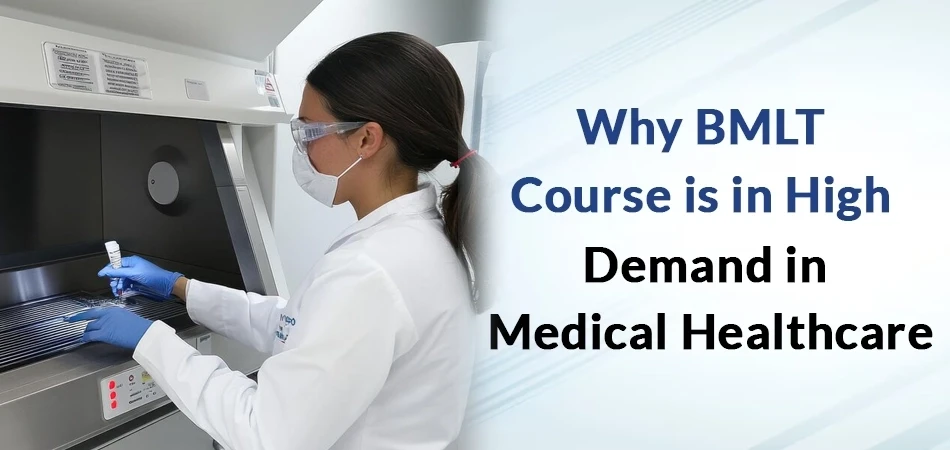Why BMLT course is in high demand in medical Healthcare

The importance of accurate diagnosis in healthcare cannot be overstated. Experienced experts in healthcare laboratories study a large amount of information that contributes to the success of every treatment. A Medical Lab Technology (MLT) Bachelor's degree offers a unique opportunity for individuals passionate about science and healthcare to make a significant impact on patient outcomes. This blog post will discuss the subject matter of this degree, its significance, and the exciting career opportunities it presents.
Why Medical Laboratory Science is essential here are some of the key reasons
1. Accurate Diagnoses
Medical laboratory scientists play a crucial role in diagnosing diseases. They analyze blood, urine, and other samples to provide accurate results, which are vital for effective treatment decisions.
2. Technological Expertise
Due to the fast development of diagnostic technologies, MLS professionals are equipped to use advanced lab equipment and analyze complex test findings to guarantee top-notch care.
3. Patient Safety
Precise lab findings have a direct effect on the safety of patients. MLS graduates play a crucial role in ensuring patients receive accurate diagnoses and suitable treatments by reducing errors in testing and analysis.
4. Interdisciplinary Collaboration
Medical laboratory scientists work closely with physicians and other healthcare professionals, facilitating effective communication and teamwork that enhances overall patient care.
5. Public Health Monitoring
MLS professionals play a crucial part in promoting public health through conducting tests to monitor the spread of diseases and monitor health patterns, important for community health and safety.
6. Research and Development
Graduates contribute to medical research, helping to develop new tests and treatments. Their expertise is vital for advancing healthcare practices and improving patient outcomes.
7. Diverse Career Opportunities
A degree in MLS opens doors to various career paths, including clinical laboratories, research institutions, and public health organizations, meeting the growing demand for skilled professionals in the field.
8. Ethical and Professional Standards
Training in MLS emphasizes ethical practices and professionalism, ensuring that graduates uphold the highest standards of integrity and quality in laboratory work.
9. Quality Control and Assurance
Medical laboratory scientists are trained in quality control measures, ensuring that laboratory processes and results meet stringent regulatory standards and guidelines.
10. Continuous Education and Adaptability
The healthcare environment is always changing. An MLS degree provides professionals with the essential knowledge and skills needed to adjust to new technologies and methodologies in their careers.
Choose Ganesh Paramedical College
A BMLT program not only grants a certification but also guides individuals towards a rewarding career vital to the healthcare sector. Because of the ongoing advancements in technology and the increasing demand for accurate diagnostics, the future looks bright for MLT professionals.
The increasing need for paramedical professionals can be attributed to the continuous expansion of the field. Those who are interested can also join the BMLT Lateral Entry program at Ganesh Parparamedical College. Register now.
FAQs
1. What is the Bachelor in Medical Lab Technology (BMLT) program?
The BMLT program is a comprehensive educational course that prepares students for careers in medical laboratory science. It covers essential topics such as clinical chemistry, microbiology, haematology, and laboratory techniques, combining theoretical knowledge with practical training in laboratory settings.
2. What is a qualification for BMLT?
Passed with 50% aggregate marks in Diploma (Medical Lab. Technology) [3 years after 10th Or 1 year after 10+2 (Medical or Non-Medical)] Or have done Diploma in Pharmacy (2 years after 10+2) Or have done Diploma in Nursing (3 years after 10th) or any equivalent course.
3. How long does it take to complete the BMLT program?
The BMLT program generally takes four years to complete for full-time students. Some institutions may offer accelerated options or part-time study, which can affect the duration of the program.
4. What career opportunities are available after earning a BMLT degree?
Graduates can pursue various roles, including Medical Laboratory Technologist, Clinical Research Coordinator, Quality Assurance Specialist, and Laboratory Manager. The demand for skilled professionals in this field is growing, providing excellent job prospects.
5. Is certification required after completing the BMLT program?
Yes, most employers prefer or require certification for medical laboratory technologists. Graduates typically need to pass a national certification exam, such as those offered by the American Society for Clinical Pathology (ASCP) or the American Registry of Radiologic Technologists (ARRT), depending on their specific focus area.

